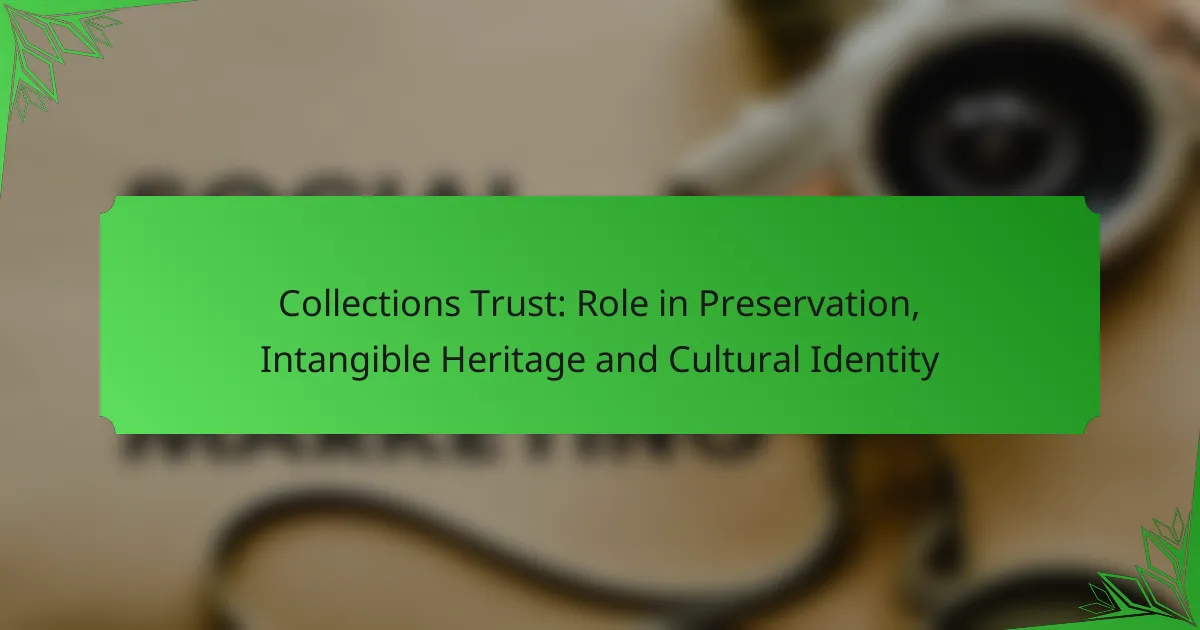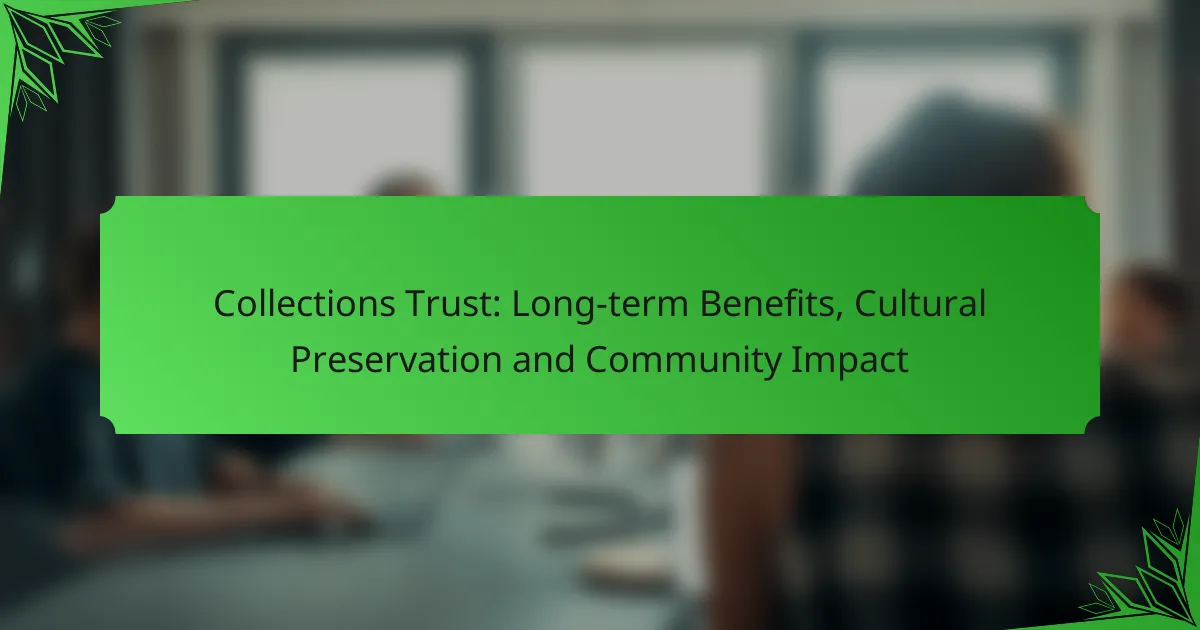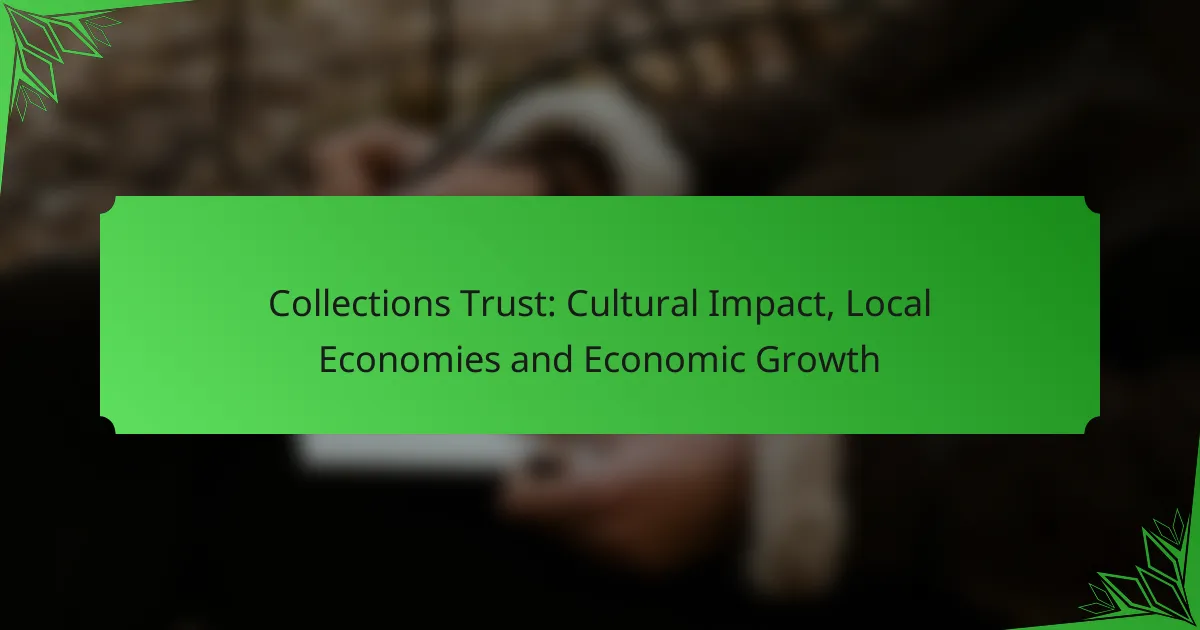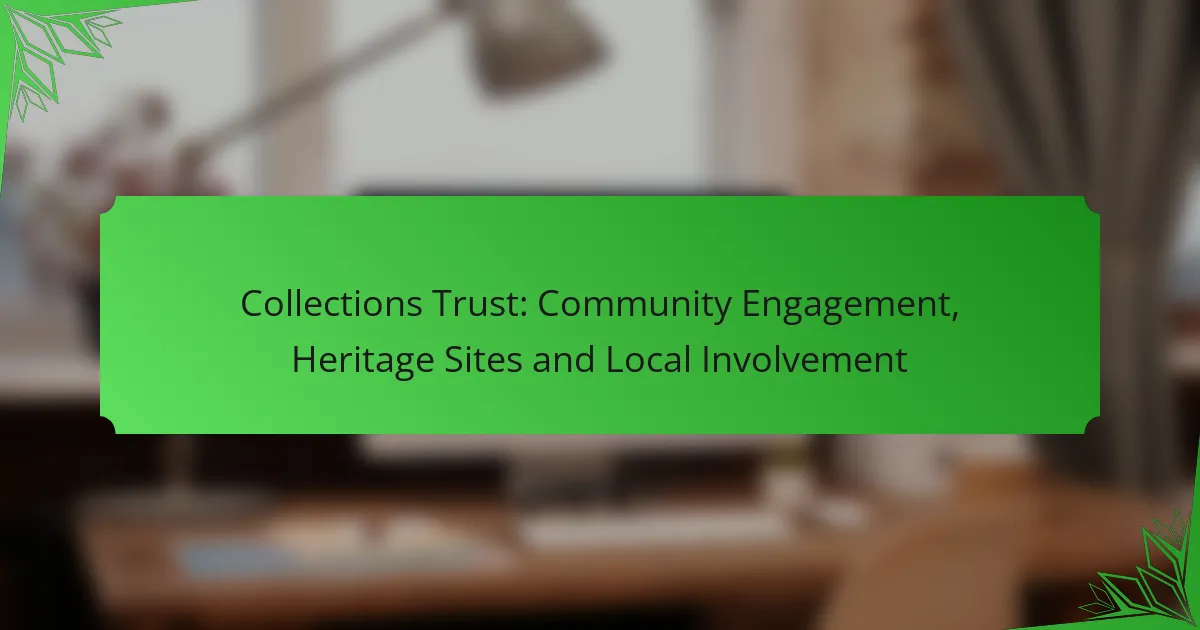The Collections Trust is instrumental in preserving cultural identity in the UK by supporting organizations in the preservation and promotion of their unique heritage. By providing frameworks and resources for safeguarding intangible heritage, it fosters a deeper understanding of local cultures and traditions, ensuring they remain relevant and accessible for future generations.
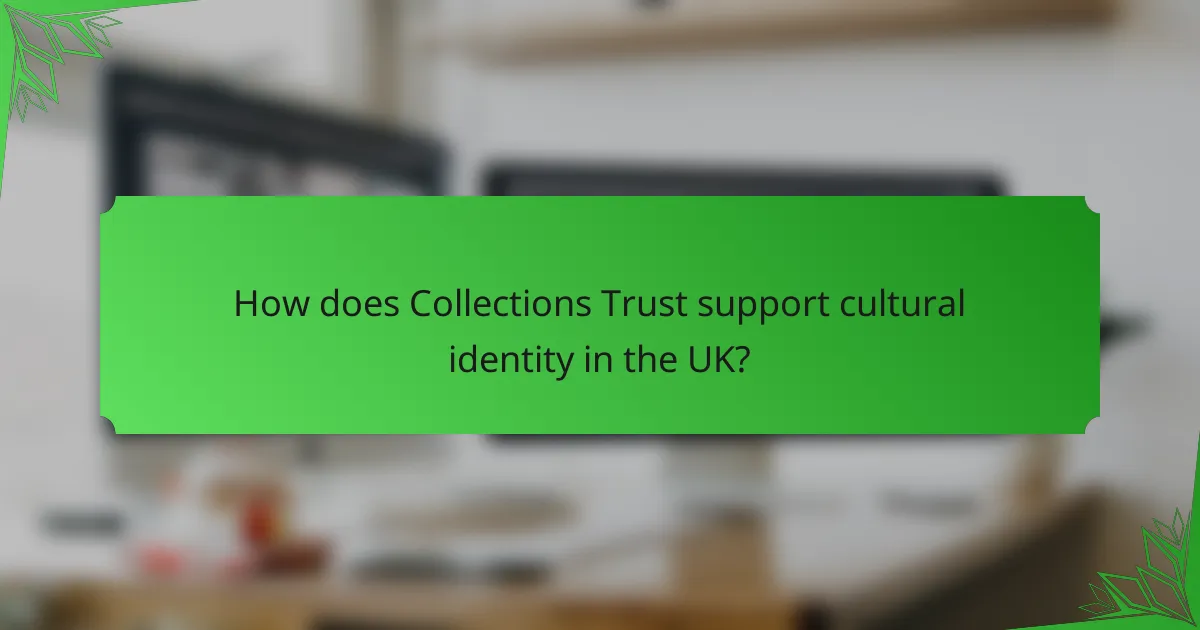
How does Collections Trust support cultural identity in the UK?
Collections Trust plays a vital role in supporting cultural identity in the UK by helping organizations preserve and promote their unique heritage. Through various initiatives, it fosters a deeper understanding of local cultures and traditions, ensuring they remain relevant and accessible to future generations.
Preservation of local traditions
Collections Trust aids in the preservation of local traditions by providing resources and guidance to museums and cultural institutions. This includes best practices for cataloging and conserving artifacts that represent community heritage. By emphasizing the importance of these traditions, Collections Trust helps ensure they are not lost over time.
For example, local museums may receive support in developing exhibitions that showcase traditional crafts, music, or festivals, allowing communities to celebrate their unique identities. This not only preserves the traditions but also encourages intergenerational knowledge transfer.
Promotion of community engagement
Community engagement is a key focus for Collections Trust, which encourages local participation in cultural activities. By organizing workshops, events, and collaborative projects, it fosters a sense of belonging and pride among community members. Engaging the public in cultural initiatives helps to strengthen social ties and enhance local identity.
For instance, community-led projects that involve storytelling or oral history can empower individuals to share their experiences and connect with their heritage. This active participation cultivates a vibrant cultural landscape that reflects the diversity of the community.
Enhancement of cultural awareness
Collections Trust enhances cultural awareness by promoting educational programs that highlight the significance of local heritage. These programs often target schools and community groups, providing them with the tools to understand and appreciate their cultural backgrounds. By raising awareness, Collections Trust helps to foster respect and appreciation for diverse cultures within the UK.
Additionally, partnerships with educational institutions can lead to collaborative projects that explore cultural themes, allowing students to engage with their heritage in meaningful ways. This not only enriches their learning experience but also instills a sense of responsibility towards preserving cultural identity.
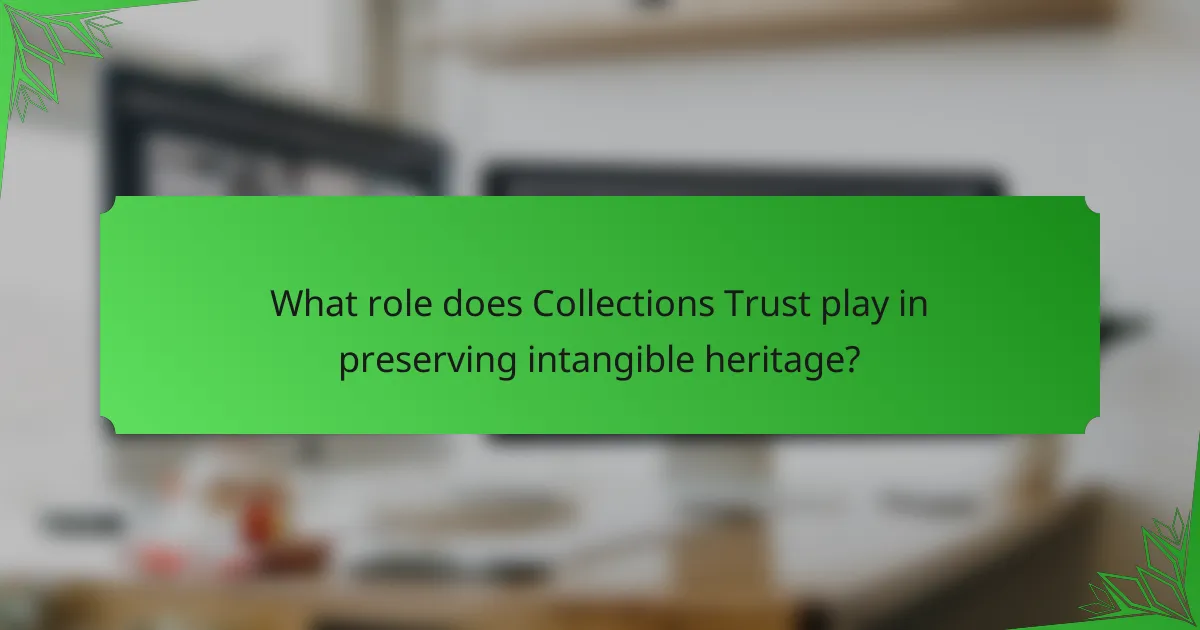
What role does Collections Trust play in preserving intangible heritage?
The Collections Trust plays a vital role in preserving intangible heritage by providing frameworks and resources that support the documentation, safeguarding, and promotion of cultural practices and expressions. This organization helps ensure that diverse cultural identities are recognized and valued, contributing to a richer, more inclusive society.
Documentation of oral histories
Documentation of oral histories is essential for preserving intangible heritage, as it captures the narratives and experiences of communities. Collections Trust encourages institutions to collect and archive these stories, often through interviews and recordings, which serve as valuable resources for future generations.
Organizations can utilize digital platforms to store and share oral histories, making them accessible to a wider audience. This approach not only preserves the content but also fosters a sense of belonging and identity within communities.
Support for traditional art forms
Support for traditional art forms is crucial in maintaining cultural heritage. Collections Trust offers guidance on best practices for preserving and promoting these art forms, which may include crafts, music, dance, and performance. By providing resources and training, they help artists and cultural practitioners sustain their practices.
Funding opportunities and partnerships with local organizations can enhance the visibility and viability of traditional art forms. Engaging younger generations through workshops and educational programs ensures that these practices are passed down and continue to thrive.
Facilitation of cultural exchanges
Facilitation of cultural exchanges is a key aspect of preserving intangible heritage, as it encourages dialogue and understanding between different communities. Collections Trust supports initiatives that promote collaboration and sharing of cultural practices, fostering mutual respect and appreciation.
Programs such as artist residencies, cultural festivals, and exchange visits can enhance cultural connections. These initiatives not only enrich participants’ experiences but also help to safeguard the unique aspects of each culture involved.

How can organizations collaborate with Collections Trust?
Organizations can collaborate with Collections Trust by engaging in partnerships that enhance preservation efforts and promote cultural identity. This collaboration can take various forms, including joint projects, funding applications, and access to training resources.
Partnership opportunities
Organizations can explore partnership opportunities with Collections Trust to strengthen their preservation initiatives. Collaborations can involve sharing expertise, co-developing projects, or participating in community outreach programs that highlight intangible heritage.
For example, museums and cultural institutions can partner with Collections Trust to create exhibitions that showcase local traditions and practices, fostering a deeper understanding of cultural identity within the community.
Funding and grants
Collections Trust can assist organizations in identifying funding and grants that support preservation and cultural projects. Many grants are available from government bodies, private foundations, and international organizations aimed at safeguarding intangible heritage.
Organizations should regularly check for funding opportunities and ensure their proposals align with the objectives of the grant providers. It is beneficial to demonstrate how the project will impact cultural identity and community engagement.
Training and resources
Training and resources provided by Collections Trust are essential for organizations looking to enhance their capabilities in preservation. Workshops, online courses, and resource materials can equip staff with the necessary skills to manage collections effectively.
Organizations should take advantage of these training opportunities to stay updated on best practices and emerging trends in preservation. Utilizing available resources can significantly improve project outcomes and community involvement in cultural heritage initiatives.

What are the best practices for engaging with Collections Trust?
Engaging with Collections Trust effectively involves adopting strategies that foster collaboration, communication, and digital outreach. By focusing on community involvement, clear communication, and leveraging digital platforms, organizations can enhance their preservation efforts and cultural identity initiatives.
Community involvement strategies
To successfully engage the community, organizations should prioritize inclusivity and participation. Hosting workshops, exhibitions, and open forums can encourage local input and foster a sense of ownership over cultural heritage. Establishing partnerships with local schools, cultural groups, and community leaders can also enhance outreach and involvement.
Consider creating volunteer programs that allow community members to contribute directly to preservation efforts. This not only builds skills but also strengthens ties between the organization and the community, ensuring that cultural identity is represented authentically.
Effective communication methods
Clear and consistent communication is essential for engaging with stakeholders. Utilize newsletters, social media, and community bulletins to share updates and gather feedback. Tailor messages to different audiences to ensure relevance and effectiveness.
Regularly soliciting input through surveys or focus groups can help gauge community sentiment and adapt strategies accordingly. Avoid jargon and use straightforward language to ensure that all community members can understand and engage with the information shared.
Utilizing digital platforms
Digital platforms are invaluable for reaching a wider audience and enhancing engagement. Create a user-friendly website that showcases collections, events, and educational resources. Social media channels can serve as interactive spaces for sharing stories and gathering community input.
Consider implementing virtual tours or online exhibitions to make cultural heritage accessible to those unable to visit in person. This approach not only broadens reach but also allows for innovative storytelling that can resonate with diverse audiences.

What challenges does Collections Trust face in the UK?
The Collections Trust in the UK encounters several significant challenges that impact its ability to preserve cultural heritage and support intangible heritage initiatives. Key issues include funding limitations, the need to balance modernity with tradition, and fostering public awareness and participation.
Funding limitations
Funding limitations are a critical challenge for the Collections Trust, as many cultural institutions rely on grants and public funding to operate. With budget cuts and increased competition for resources, securing adequate financial support has become increasingly difficult.
Organizations often face constraints that limit their ability to implement preservation projects effectively. This can result in prioritizing immediate needs over long-term preservation goals, which may jeopardize the integrity of cultural collections.
Balancing modernity with tradition
Balancing modernity with tradition is essential for the Collections Trust, as it seeks to integrate contemporary practices while honoring historical methods of preservation. This challenge requires careful consideration of how new technologies can enhance rather than replace traditional approaches.
For example, while digital archiving can improve access to collections, it is crucial to ensure that the physical artifacts are preserved in their original form. Striking this balance helps maintain cultural identity while adapting to changing societal needs.
Public awareness and participation
Public awareness and participation are vital for the success of the Collections Trust’s initiatives. Engaging the community in preservation efforts fosters a sense of ownership and responsibility towards cultural heritage. However, many individuals may not fully understand the importance of these efforts.
To enhance public involvement, the Collections Trust can implement outreach programs that educate the community about the significance of cultural heritage. Workshops, exhibitions, and social media campaigns can help raise awareness and encourage active participation in preservation activities.
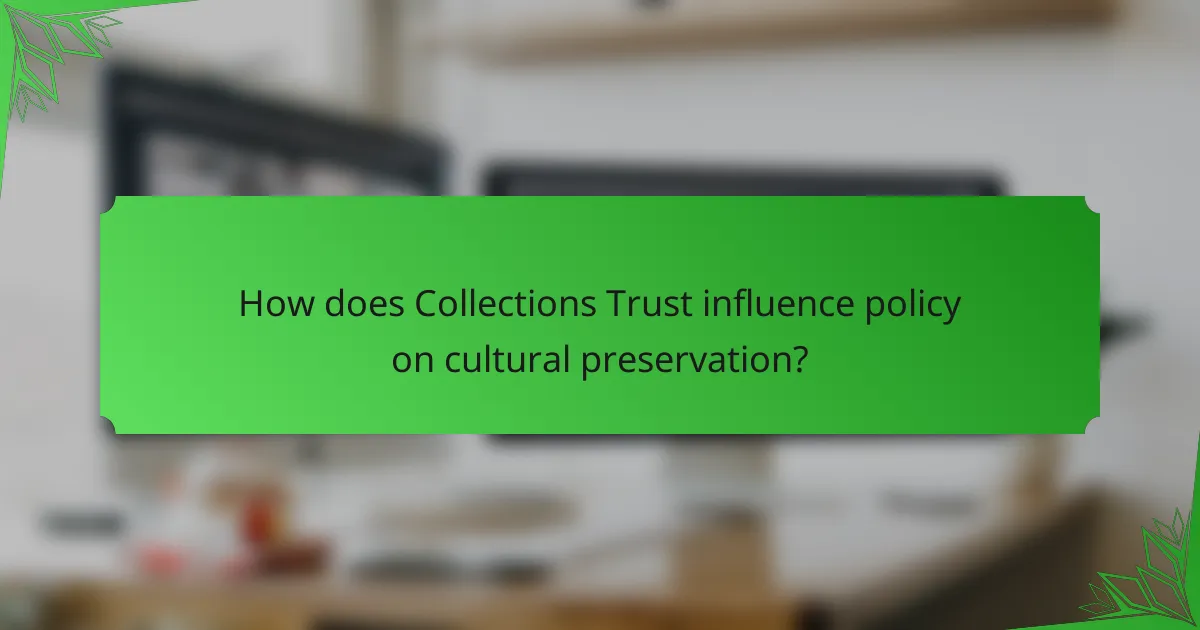
How does Collections Trust influence policy on cultural preservation?
Collections Trust plays a crucial role in shaping policies related to cultural preservation by providing expert guidance and resources to organizations and governments. Their influence helps ensure that cultural heritage is recognized, protected, and effectively managed across various sectors.
Advisory roles in government
Collections Trust serves as an advisor to government bodies, helping to formulate policies that support the preservation of cultural heritage. They engage with policymakers to advocate for the importance of safeguarding intangible heritage and cultural identity, ensuring that these elements are integrated into national and local strategies.
By collaborating with various stakeholders, including museums, archives, and cultural institutions, Collections Trust helps create frameworks that prioritize cultural preservation. Their advisory role often includes providing training and resources to enhance the capacity of these organizations in managing their collections effectively.
Development of preservation standards
Collections Trust is instrumental in developing preservation standards that guide institutions in the proper care and management of cultural artifacts. These standards are designed to address both tangible and intangible heritage, ensuring comprehensive approaches to preservation.
The organization collaborates with experts to create best practices that institutions can adopt, which often include guidelines on documentation, conservation techniques, and community engagement. By establishing these standards, Collections Trust helps institutions maintain high-quality preservation efforts that reflect the cultural significance of their collections.






